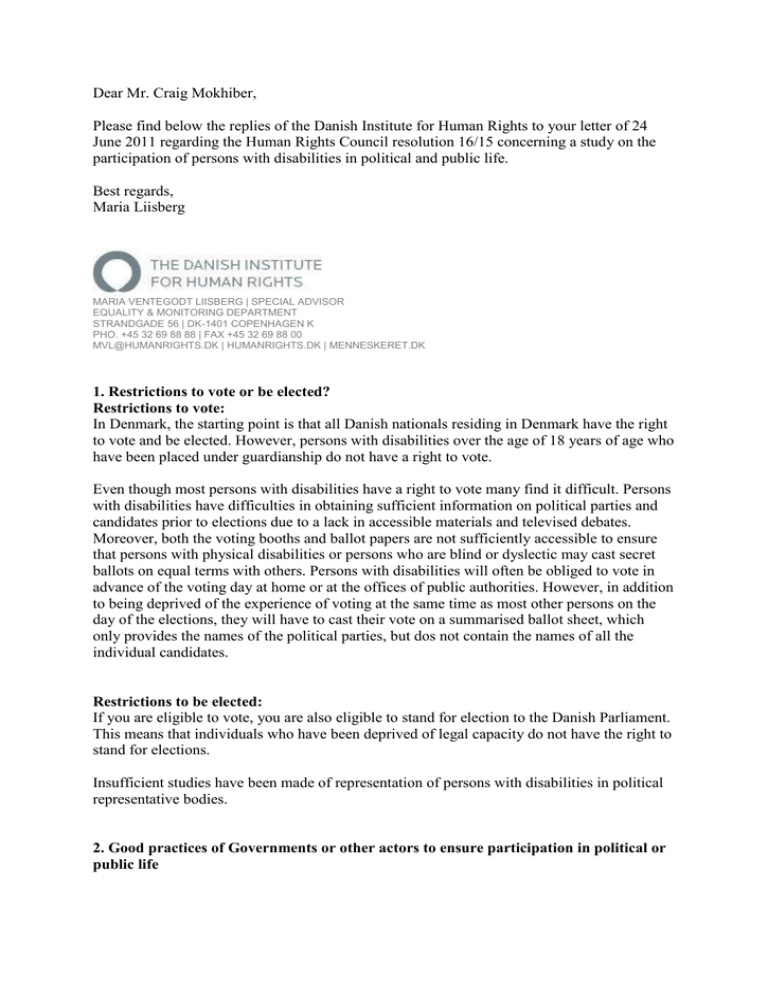Dear Mr. Craig Mokhiber,
advertisement

Dear Mr. Craig Mokhiber, Please find below the replies of the Danish Institute for Human Rights to your letter of 24 June 2011 regarding the Human Rights Council resolution 16/15 concerning a study on the participation of persons with disabilities in political and public life. Best regards, Maria Liisberg MARIA VENTEGODT LIISBERG | SPECIAL ADVISOR EQUALITY & MONITORING DEPARTMENT STRANDGADE 56 | DK-1401 COPENHAGEN K PHO. +45 32 69 88 88 | FAX +45 32 69 88 00 MVL@HUMANRIGHTS.DK | HUMANRIGHTS.DK | MENNESKERET.DK 1. Restrictions to vote or be elected? Restrictions to vote: In Denmark, the starting point is that all Danish nationals residing in Denmark have the right to vote and be elected. However, persons with disabilities over the age of 18 years of age who have been placed under guardianship do not have a right to vote. Even though most persons with disabilities have a right to vote many find it difficult. Persons with disabilities have difficulties in obtaining sufficient information on political parties and candidates prior to elections due to a lack in accessible materials and televised debates. Moreover, both the voting booths and ballot papers are not sufficiently accessible to ensure that persons with physical disabilities or persons who are blind or dyslectic may cast secret ballots on equal terms with others. Persons with disabilities will often be obliged to vote in advance of the voting day at home or at the offices of public authorities. However, in addition to being deprived of the experience of voting at the same time as most other persons on the day of the elections, they will have to cast their vote on a summarised ballot sheet, which only provides the names of the political parties, but dos not contain the names of all the individual candidates. Restrictions to be elected: If you are eligible to vote, you are also eligible to stand for election to the Danish Parliament. This means that individuals who have been deprived of legal capacity do not have the right to stand for elections. Insufficient studies have been made of representation of persons with disabilities in political representative bodies. 2. Good practices of Governments or other actors to ensure participation in political or public life The Equal Opportunities Centre for Disabled Persons in Denmark was part of an EU-project ''My opinion my vote – MOTE'' from 2008 to 2010. The aim of the project was to increase the political participation among people with learning disabilities. The latest report from the project can be read here: http://www.clh.dk/index.php?id=1630 More information can be found on: www.myopinionmyvote.eu 3.a Good practices to ensure close and active consultation In Denmark the disability movement has a long and strong tradition. The Danish Disabled Persons Organisations which is an umbrella organisation for the majority of disability organisation in Denmark with around 320.000 members. This is enormous considering that Denmark has a population of around 5.5 million. The Danish disability organisations receive semi-public financial support. In Denmark, the consultation and participation of NGOs in the conduct of public affairs has been formalised with the creation of Disability Councils in all local councils and at central State level. The local councils are responsible for administering social, labour market and educational legislation. The disability council consist of representatives of local political parties, business interests, employers and employees’ organisations and disability organisations. They are not involved in decision-making in individual cases, but will be asked to comment on general policies, including of course the disability policies of the local councils. On central level, the Central Disability Council (dch.dk) seeks to influence the Parliament and government to adopt laws and policies which will help to ensure equal opportunities of persons with disabilities. 3.b Good practices to promote participation in non-governmental organizations See above under 3a. 4. Monitoring the Convention In Denmark, a framework consisting of the Danish Institute for Human Rights, the Central Disability Council and the Ombudsman has been set up to promote, protect and monitor the implementation of the CRDP. As mentioned above under 3a, disability organizations are represented on the Central Disability Council. In addition, the Danish Institute for Human Rights also ensures that disability organizations are closely involved in the work of the Institute. Danish Disabled Persons’ Organisation and other disability organizations are represented on the Council and the Board of the Danish Institute for Human Rights. In addition, the Institute has held round-table meetings on the mandate of the Institute to which all disability organizations were invited. 5. Statistics and data Unfortunately, no statistics are available on political participation of persons with disabilities. 6. International cooperation programme The Danish Institute for Human Rights (DIHR) has been working with partners in Ukraine since 2003 with the objective of supporting the development of an active and vibrant civil society, the rule of law, judicial independence, and the fostering of a human rights culture throughout the country. DIHR provides expert advice to the Organization for Security and Cooperation in Europe (OSCE) and its activities to build the capacity of Ukrainian civil society organizations (CSOs) at national, regional, and local levels as well as to strengthen existing structures and experience within the CSO sector. Several CSOs involved in the project are disabled persons’ organizations. For more information on the project, please see: http://www.undp.org.ua/en/projects-list-all/34-democratic-governance-/880-civil-societydevelopment-programme 7. Additional information A Danish survey points out that many people with learning disabilities do not experience a natural expectation of having an opinion of their own or being responsible for themselves during their upbringing or at school. Likewise, many have not been taught about democratic conventions such as decision-making processes and legislation etc. (”Veje til reelt medborgerskab. En kortlægning af udviklingshæmmedes vilkår for selvbestemmelse og brugerinddragelse”, Henriette Holmskov og Anne Skov, Handicapenheden, Servicestyrelsen 2007.)




